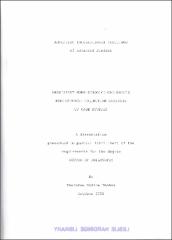Persistent home-schooled children's perceptions : collective analysis of case studies
Abstract
The purpose of this study was to discover what non-British and non-American elementary and middle school aged home-schooled children themselves think of the experience of being home schooled, after having home schooled for at least one year. Whether or not their perceptions agree with those of their parents was also investigated. This population represents home-schooling families who have not successfully persisted in the practice of home schooling. Nineteen children and 13 adults from 12 families representing 8 countries (Brazil, Chile, France, New Zealand, the Philippines, South Africa, Spain, and Taiwan) were interviewed using semi-structured interview questions via Internet chat programs and/or email. Participants were interviewed twice and additional documentation such as photos and curriculum materials was requested and used for triangulation purposes. Results showed that the perceptions of the home-schooled children f their experience are positive academically, emotionally, socially, and spiritually. Their perceptions agree with those of their parents. This suggests that the information from one source (either children or parents) is sufficient to attribute to the other.
Amongst others, the following recommendations are made: that parents consult with their children in the decision to home school; that schools and governments be more accepting and supportive of home school choices and initiatives; that further study be done on the perceptions of high school aged home schoolers; and that study be done to determine whether in fact there is a relationship between the age at which home schooling begins, and the style of home schooling which the family follows as indicated by this study.


